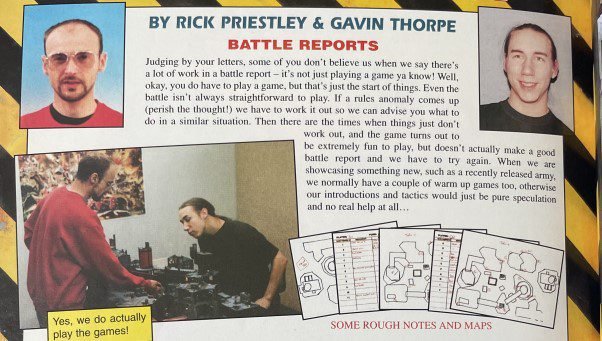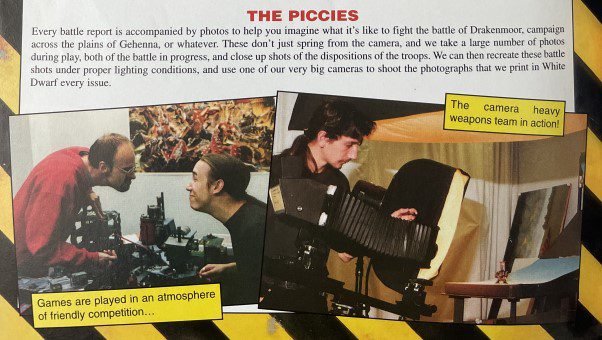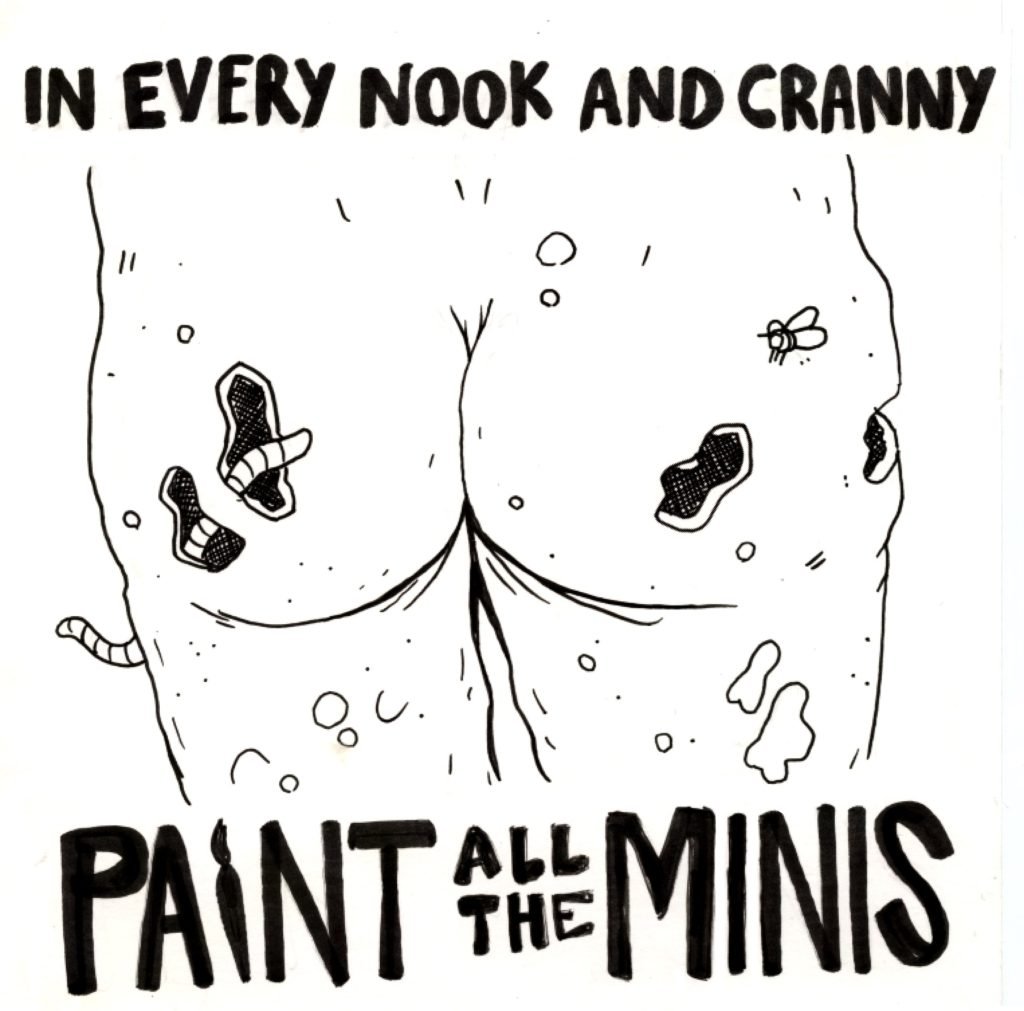There’s been a large Jervis Johnson-sized hole in Bedroom Battlefields’ list of interviews with hobby legends (such as Gav Thorpe, Tuomas Pirinen, Rick Priestley, and Alessio Cavatore). Suffice to say, that hole has now been plugged. Thank you so much, Jervis, for taking the time to respond to these questions.
That said, Andy still beat you to it. Some things never change, eh? 😀
Let’s get into it…
Q&A With Hobby Legend Jervis Johnson
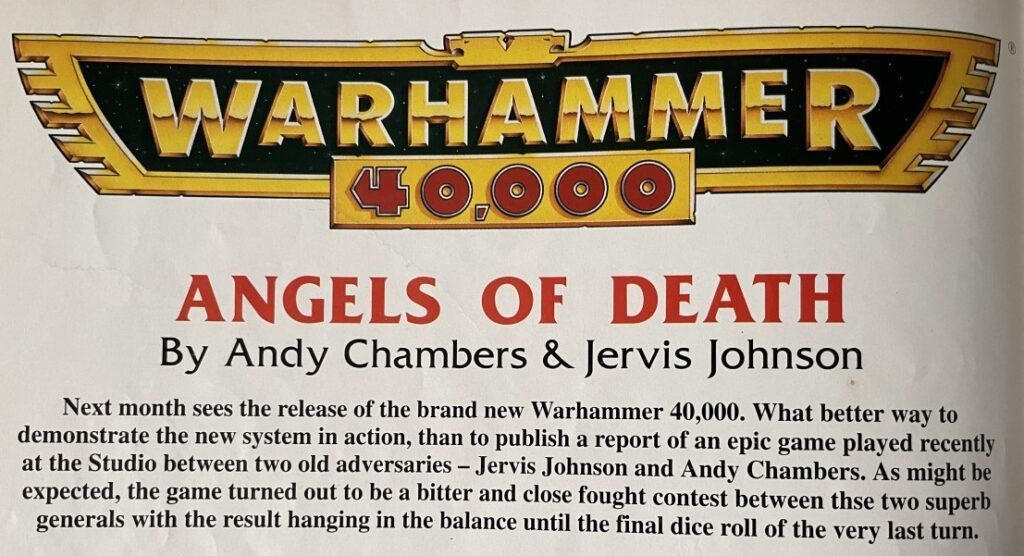
Why do you think this hobby still exists?
Jervis Johnson: I think it exists because it offers a combination of things that other hobbies don’t, namely ‘collecting, painting and playing games with toy soldiers’ (or ‘with exquisitely crafted miniature figures’ if you prefer 😉). Digging deeper into that, hobbies like ours allow people to exercise their creativity; no one else will have an army/collection quite like yours, it is unique and only exists because you created it. Not everybody needs to exercise their creativity like this, but many do, and I think this is why the hobby is unlikely to die out in the face of things like video games and such-like. Although you can say that a tabletop wargames and video games are both ‘games’, they scratch very different itches.
Powered by RedCircle
What’s your favourite book of all time? Doesn’t need to be hobby-related.
Jervis Johnson: I found it impossible to pick one, so instead, I’ve picked my top 5:
Dune: I first read Dune when I was 14. I recently re-read it, and it still stands up. The latest movie finally does it justice, and there are some great games based on it too (a particular favourite with my local boardgames group is Dune Imperium).
The Lord of the Rings: (though the Conan stories by Robert E Howard come a very close second). I read all of these at more or less the same time as I read Dune, and I still think they are great to this day. I’m also a big fan of the Conan comic book series, especially the early run with the artwork by Barry Windsor-Smith. The adaption of Red Nails by Roy Thomas and Barry Windsor-Smith is one of my favourite comic books of all time.
Peter the Great: His Life and World: I read a lot of non-fiction history books and always have, but this book by Robert K. Massie is my favourite. I picked it up because it had such great reviews, knowing nothing about the subject, and it was a revelation. Never was ‘truth is stranger than fiction’ more apt! A fascinating man, an eventful life, and an extraordinary world.
Dreaming of Babylon: This is a strange little book by an American author called Richard Brautigan. He mainly wrote rather surreal short stories, but this is a proper novel. It’s set in 1942 and is about an inept private eye whose investigations are hindered by the fact that he keeps daydreaming about an alternative life where he lives in ancient Babylon. If that sounds weird, well it is, but there was something about the main character that spoke to me, because I tend to spend a lot of time ‘living in my head’ too.
Grendel: Another strange little book, this time by an author called John Gardner. It retells the story of Beowulf, but from the perspective of the monster that Beowulf ultimately kills. It’s just beautifully written and deals with all kinds of interesting themes, but I especially like the way it deals with issues to do with good and evil; in Grendel, the monster is not really an evil being, more a hopelessly alienated one.
Who or what is your biggest inspiration in what you do?
Jervis Johnson: My biggest inspiration would have to be Charles Grant (senior). It was his book Battle: Practical Wargaming that first introduced me to tabletop wargames, and the battle reports he wrote for Military Modelling magazine were the inspiration for the battle reports that Andy Chambers and I created for White Dwarf. I think he is probably the best pure writer about the tabletop wargame hobby there has ever been; I found (and still find) his writing to be witty, erudite, wise and helpful. When I first started writing J Files articles for White Dwarf, I tried to channel my inner Charles Grant, and I hope that I achieved that goal to some small extent, but for me, he is still the master.
What’s your best-value budget hobby purchase? (sub £20)
Jervis Johnson: I think I would go for a Daylight Bulb and a Hands-free Magnifying Glass. When I was working full-time painting during the daytime wasn’t usually an option – I was a rules writer, not a member of the ‘Eavy metal Team – so I, like most hobbyists, painted my miniatures in the evening after work. As I got older my eyesight slowly got worse, until I found it really difficult to paint miniatures. Someone recommended I get a good Daylight Bulb and a Hands-free magnifying Glass, which made things so much easier.
If you could live in any historical period, where, when, and why?
Jervis Johnson: Well, it’s sort of a historical period, so I am going to go for the village where Asterix the Gaul lives. I love the Asterix books, and I’ve always said that if I could live anywhere it would be in that village with the rest of the indomitable Gauls, where my only fear would be the sky falling on my head!
Do you think there are any under-utilised settings or periods in tabletop gaming?
Jervis Johnson: On the whole, no. I think that more attention could be paid to counter-factual history (e.g. British military involvement in the American Civil War), and I’d like to see more campaign-level tabletop wargames (e.g. where you refight the whole of the Waterloo campaign as a tabletop game, not just the individual battles), but I can’t say I’ll lose any sleep if this doesn’t happen!
What might people be surprised to hear you’re not very good at?
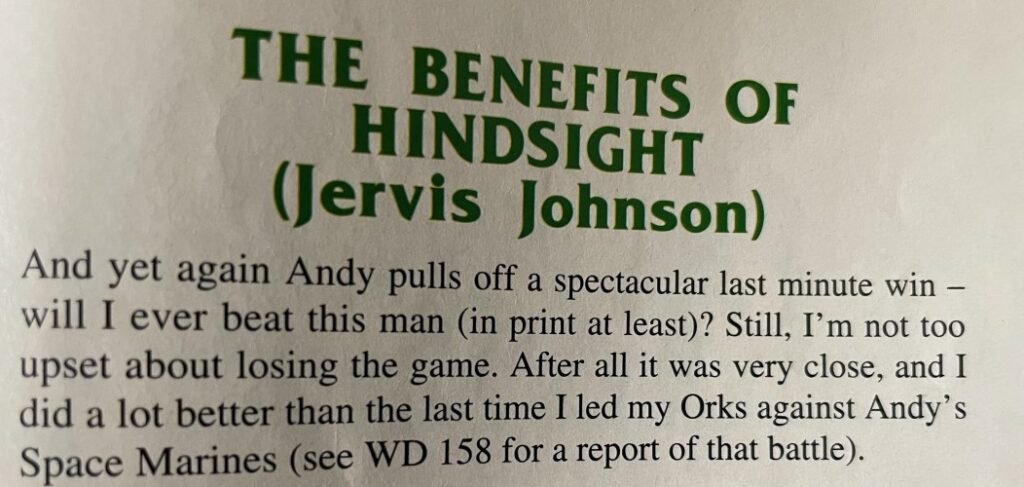
Jervis Johnson: I’m not sure how surprised they’ll be to hear it, especially if they read my battle reports against Andy Chambers in White Dwarf magazine, but I’m not a very good player of the games that I have designed. I know I’m not the only game designer who is like this; I think it’s because I try to play the game the way I wanted it to work, which isn’t always the best way to use the game system to actually win the game!
What have you recently changed your mind about?
Jervis Johnson: I used to be obsessed with watching the news. However, what with COVID and the war in the Ukraine, I found that the relentlessness of the (bad) news cycle was starting to really get me down. Then about 18 months ago, I came across a book called ‘Stop Reading The News’ by Rolf Dobelli, which pretty much explains why you should do exactly that. So, for the last year and a half, I haven’t watched the news, read a newspaper, looked at a news feed or even read a newspaper headline, and I feel much better for it!
When was the last time something in the hobby surprised you?
Jervis Johnson: I’ve been around for a while now, so not much surprises me. The most recent thing that really stands out is the success of board game cafes. There are three in Nottingham (not counting Warhammer World), and when the first one opened, I thought it was doomed to failure; I wasn’t at all convinced that people would be willing to pay money to be able to sit at a games table. My wife was of quite the opposite point of view and made the really good point that games cafes would be great places for people that want to go out and socialise but didn’t want to go to a pub or club. Fortunately, she was proved right and I was proved wrong, and the Nottingham’s games cafes are thriving.
Tell me something that’s true that almost nobody agrees with you on.
Jervis Johnson: Gosh, there are so many! As a rules writer, one of the things that you quickly learn is that things that seem self-evident to you are not nearly so obvious to other people! But to pick one, I’ll go with something almost none of my geek friends agree with me on, which is that it’s good to periodically clear out stuff from your collections. I’ve never been much of a packrat, and over the last decade or two, I’ve ended up moving several times; each time I moved I ended up culling my collection of hobby stuff – games, miniatures, comics and books – down a bit. To start off with, it wasn’t a choice but a necessity, but each time I had to do it, I found it liberating: a literal weight being lifted.
It also made me go through each item in my collection to decide which made the cut and which didn’t, which is an interesting and illuminating process in and of itself. After my last move, I have my own (small) study with shelves and glass cabinets, and I follow a rule that if I can’t put something where I can see it, then it has to go. So, no lead under the bed or in the attic for me! I will often tell my geeky friends that they should do it too – without exception, they look at me as if I am crazy!
Are there any common hobby myths and misconceptions that make you roll your eyes?
Jervis Johnson: Probably the biggest is the idea that errors in a rulebook or lack of balance in an army list is because the rules writer is lazy or incompetent, or because of a lack of playtesting. This is usually followed by a comment like, “After all, if we could spot these things within a few days of the rules coming out, how could they have possibly missed it?”. It shows such a complete lack of understanding about how difficult these things are to get right, and also of the actual process by which rules and army lists are written.
Anyway, for the record, I have never met or worked with a rules writer I’d consider lazy or incompetent. Furthermore (comrades!), rule’s writing is a process of constant iteration and rewriting that carries on until you hit a deadline. In my experience, almost without exception… actually, no, without exception, errors and balance issues are caused by things that were changed in the last set of rewrites before the deadline was hit, and they were made to fix issues that playtesting had revealed. Having written rules for 40-odd years and never managing to get a set published without at least an error or two, you learn to be sanguine about it and to be ready to get the errata and clarifications out there as fast as possible!
Tell me about a particularly satisfying mechanic you’ve created yourself or encountered while playing someone else’s game.
Jervis Johnson: One mechanic I came across recently and really like is used in a series of games called Table Battles, published by a small company called Hollandspiele. The games recreate various famous battles from history and use cards to represent the major formations of each army.
In your turn, you roll six dice, and then allocate them out to cards in your army; each card needs certain combination of dice to be able to carry out an action. So one card might need a pair of 5s to attack, while another might need you to place a 4, a 5 and a 6 on the card, and so on. Any dice that are placed on a card can’t be rolled again until they are used, so the dice are a limited resource, and you need to think hard about where to place them. At the start of your turn, before you roll the dice, you can carry out an action you have set up with your earlier dice rolls.
What I especially like about this mechanic is that sometimes, when you attack, you will force your opponent to make a reaction, and this will stop them from carrying out their action in their next turn (they are reacting to your attack rather than unleashing their own). These simple mechanics do a lot to represent command and control issues, and they also capture the idea of one side gaining the momentum in a battle, which is something I have read about in lots of historical accounts but very rarely seen recreated in a game.
Do you have any advice for those who want to follow your path?
Jervis Johnson: The advice I always give is to consider carefully that doing so could well lead to you losing your hobby, by turning it into your job. If you spend all day designing games, then, if you are anything like me, you will find that the last thing you want to do when you get out of the office is play the game you’ve been working on from 9-5. Luckily for me, I love all sorts of different games, so I was able to side-step this problem by playing historical games, non-GW board games and classic games like bridge and backgammon outside work. But if your hobby is purely, say, 40K, then you need to consider seriously that getting a job with the 40K rules team might kill your love of the hobby stone-dead.
What are you working on right now, and what would you like to share or promote with the audience?
Jervis Johnson: I’ve been working away with miniature designers Alan and Michael Perry on a set of historical wargame rules called Valour and Fortitude. They are available for free – you can download them from the Wargames Illustrated and Perry Miniatures websites. They started life as a sort of thought experiment to see if we could come up with a set of rules designed to fit onto just four sides of A4 (or, more specifically, a A3 piece of paper folded in half).
A similar design process was followed with the army sheets and scenarios needed to play the game. The army sheets are designed to fit onto a single piece of paper and contain all the information and special rules a player needs to use an army in a game of V&F. The scenarios also fit onto a single side of A4 and provide all the information and special rules needed to fight a battle. So, if you have the rules sheet, your army sheet and the scenario, you are good to go! The result is a tight little set of rules that, being only 4 pages long, are easy to teach and to use. You can download the rules from Perry-Miniatures.com or wargamesillustrated.net, and there is a V&F Gamers Group page on Facebook, too.
Huge thanks to Jervis Johnson for taking the time to chat. We really appreciate it!
Enjoyed this? Be sure to check out our chats with fellow industry heroes Gav Thorpe, Andy Chambers, Tuomas Pirinen, Rick Priestley, and Alessio Cavatore, too.

